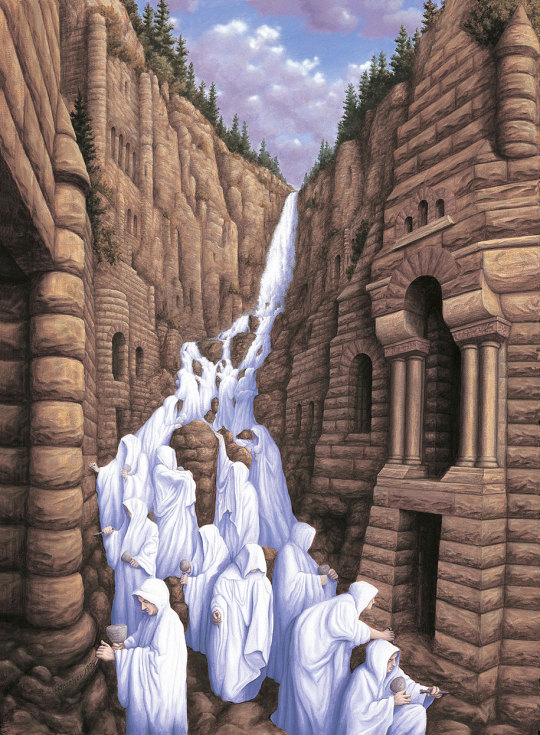Photo

There is always something left to love.
― Gabriel García Márquez
2 notes
·
View notes
Photo

[Holy Gospel of Jesus Christ according to Saint Matthew 11:20-24]
Then Jesus began to denounce the towns in which most of his miracles had been performed, because they did not repent. “Woe to you, Chorazin! Woe to you, Bethsaida! For if the miracles that were performed in you had been performed in Tyre and Sidon, they would have repented long ago in sackcloth and ashes. But I tell you, it will be more bearable for Tyre and Sidon on the day of judgment than for you. And you, Capernaum, will you be lifted to the heavens? No, you will go down to Hades. For if the miracles that were performed in you had been performed in Sodom, it would have remained to this day. But I tell you that it will be more bearable for Sodom on the day of judgment than for you.”
[Commentary by Allen Ross]
We can see three separate topics developing here, and the three developing in a logical argument. The first is the announcement of impending doom on the people who did not repent (verses 20-24); the second is the disclosure that all revelation comes through Jesus Christ (verses 25-27); and the third is the invitation to come to Jesus to find spiritual and eternal rest (verses 28-30). There is the word of condemnation, the word of revelation, and the word of invitation. This is a good pattern to follow in any presentation of the Gospel: all have sinned and will face judgment, God has sent His Son so that we might escape the judgment, but we have to come to Christ and by faith follow Him.
The passage begins with Jesus’ denouncing the cities where He did so many miracles.
Jesus spent a good deal of His time preaching in these and other towns, and doing most of His mighty works in this area. The people were glad to listen to Jesus, they were delighted that He healed so many of them, and they were pleased to be fed when He multiplied the food. Biblical scholars often refer to the first year of Jesus in this region of the Galilee as the year of His popularity. The people wanted to make Him king.
So why was Jesus denouncing the people now? Because they would not repent. He had not been doing the miracles to meet their physical needs alone. He had not been teaching them about the kingdom to gain political support. He had been ministering among them to bring them to salvation, and that began with their repentance. People like the idea of religion if it gives them what they want, or if it makes them feel comfortable in their lives. But, when it calls for repentance...
The people of Tyre and Sidon were idolaters; idolaters may be confused and blind in their pagan practices--but at least they know that they have a spiritual need. They just do not know how to meet it. But the Jews in Jesus day were not idolaters--that had been knocked out of them at the Babylonian captivity. They were strict monotheists, and with that, legalistic and self-righteous. People who believe they have the truth will not be open to more revelation; people who are self-righteous do not think they need to repent; and people who have come to their own strict, monotheistic perception of God have a hard time accepting who Jesus is.
The call is for people to come to Him. This is ultimately a figure of speech, comparing believing in Him to the act of coming to Him. It indicates that one must believe in Jesus and seek forgiveness and salvation from Him. The act of faith would not be a momentary response, but it would be a whole new orientation to the spiritual life. Genuine faith will find expression in learning from Jesus, or taking His yoke.
In the first two chapters Paul explains that all have sinned and are separated from God--that is what makes the soul weary and life a burden. And even though the have the Law, they cannot keep it to earn salvation, for the Law keeps revealing their sins.
1 note
·
View note
Photo

[Holy Gospel of Jesus Christ according to Saint Matthew 10:34-42]
Do not suppose that I have come to bring peace to the earth. I did not come to bring peace, but a sword. For I have come to turn
“‘a man against his father, a daughter against her mother, a daughter-in-law against her mother-in-law— a man’s enemies will be the members of his own household.’
“Anyone who loves their father or mother more than me is not worthy of me; anyone who loves their son or daughter more than me is not worthy of me. Whoever does not take up their cross and follow me is not worthy of me. Whoever finds their life will lose it, and whoever loses their life for my sake will find it.
“Anyone who welcomes you welcomes me, and anyone who welcomes me welcomes the one who sent me. Whoever welcomes a prophet as a prophet will receive a prophet’s reward, and whoever welcomes a righteous person as a righteous person will receive a righteous person’s reward. And if anyone gives even a cup of cold water to one of these little ones who is my disciple, truly I tell you, that person will certainly not lose their reward.”
[Commentary by Elisabeth Johnson]
Jesus evidently intends his disciples to be the answer to their own prayer, for at the beginning of chapter 10, he is sending them out, giving them "authority over unclean spirits, to cast them out, and to cure every disease and every sickness" (10:1). Jesus instructs the twelve to "go only to the lost sheep of the house of Israel" and to "proclaim the good news, 'The kingdom of heaven has come near.' Cure the sick, raise the dead, cleanse the lepers, cast out demons" (10:5-8).
The disciples are to act as envoys of Jesus, extending his ministry, proclaiming the same good news and performing the same works of healing that he is doing. Jesus' further instructions make clear that the disciples are also to share in his poverty and homelessness, taking with them no money or extra clothing, and depending solely on the hospitality of others for shelter and sustenance (10:8b-13).
They will not be welcomed everywhere (10:14-15), and they can expect to experience the same hostility Jesus often does, for he is sending them out "like sheep into the midst of wolves" (10:16). They can expect to encounter persecution and trials (10:17-23), for "a disciple is not above the teacher, nor a slave above the master" (10:24-25). They need also be prepared for painful division within families, and to be willing to put Jesus' mission above family loyalties (10:34-38). For all of this risk and suffering, Jesus promises, "those who lose their life for my sake will find it" (10:39).
Sent by God, Jesus sends his disciples to participate in his mission of proclaiming in word and deed the good news of God's kingdom drawing near. Matthew assumes that the church is a "sent" church, a missionary church (Matthew 28:18-20). There is simply no other way to be the church! This understanding is being recovered in our own day with the missional church movement. There is growing awareness that mission is not just a program of the church; it is (or ought to be) the defining purpose of everything the church does.
An approach to preaching Matthew 10:40-42 might be to focus a congregation's attention on what it means to be sent. Perhaps not all are sent to be wandering missionaries, depending on others for shelter and sustenance, but that doesn't mean we are off the hook. The entire baptized are sent into the world to tell and embody the good news of Jesus Christ. All are sent to bear Christ to others with humility and vulnerability, being willing to risk rejection.
What would happen if we stopped expecting people to come on their own initiative through our church doors, and instead took seriously our calling to bring the gospel to them? What would happen if we truly believed that we bear the presence of Christ to every person we encounter, in every home, workplace, or neighborhood we enter? What would happen if we saw every conversation as an opportunity to speak words of grace, every interaction as an opportunity to embody Christ's love for the neighbor?
0 notes
Photo

[Holy Gospel of Jesus Christ according to Saint Matthew 13:1-23]
That same day Jesus went out of the house and sat by the lake. Such large crowds gathered around him that he got into a boat and sat in it, while all the people stood on the shore. Then he told them many things in parables, saying: “A farmer went out to sow his seed. As he was scattering the seed, some fell along the path, and the birds came and ate it up. Some fell on rocky places, where it did not have much soil. It sprang up quickly, because the soil was shallow. But when the sun came up, the plants were scorched, and they withered because they had no root. Other seed fell among thorns, which grew up and choked the plants. Still other seed fell on good soil, where it produced a crop—a hundred, sixty or thirty times what was sown. Whoever has ears, let them hear.”
The disciples came to him and asked, “Why do you speak to the people in parables?”
He replied, “Because the knowledge of the secrets of the kingdom of heaven has been given to you, but not to them. Whoever has will be given more, and they will have an abundance. Whoever does not have, even what they have will be taken from them. This is why I speak to them in parables:
“Though seeing, they do not see; though hearing, they do not hear or understand.
In them is fulfilled the prophecy of Isaiah:
“‘You will be ever hearing but never understanding; you will be ever seeing but never perceiving. For this people’s heart has become calloused; they hardly hear with their ears, and they have closed their eyes. Otherwise they might see with their eyes, hear with their ears, understand with their hearts and turn, and I would heal them.’
But blessed are your eyes because they see, and your ears because they hear. For truly I tell you, many prophets and righteous people longed to see what you see but did not see it, and to hear what you hear but did not hear it.
“Listen then to what the parable of the sower means: When anyone hears the message about the kingdom and does not understand it, the evil one comes and snatches away what was sown in their heart. This is the seed sown along the path. The seed falling on rocky ground refers to someone who hears the word and at once receives it with joy. But since they have no root, they last only a short time. When trouble or persecution comes because of the word, they quickly fall away. The seed falling among the thorns refers to someone who hears the word, but the worries of this life and the deceitfulness of wealth choke the word, making it unfruitful. But the seed falling on good soil refers to someone who hears the word and understands it. This is the one who produces a crop, yielding a hundred, sixty or thirty times what was sown.”
[Commentary by Elisabeth Johnson]
Jesus teaches from a boat at sea (13:1-2), but his teaching is earthy, using images of seeds and soil. The parable of the sower is unusual in that Jesus offers an allegorical interpretation of it to his disciples. The interpretation focuses on reception of the seed by various kinds of soil as an allegory for varying responses to "the word of the kingdom" (13:19).
Jesus' clear explanation of what each element in the parable represents would seem to leave little work for the preacher. But the interpretation also raises some troubling questions. For instance, who qualifies as "good soil"? Since soil cannot change itself, is there any hope for the hardened, rocky, and thorny soil? Are these destined to be unproductive forever?
One can find examples of each kind of response to the word in Matthew's Gospel. There are many in Matthew's story who "hear the word of the kingdom and do not understand" (3:19), including the religious leaders who are antagonistic to Jesus' ministry from the beginning. The crowds respond positively to Jesus, especially to his miracles of healing (9:8; 15:31; 21:8-9), yet turn against Jesus at the end and demand his crucifixion (27:15-23), leaving us to wonder whether they ever truly understood.
The disciples themselves might be included among those who fall away "when trouble or persecution arises on account of the word" (3:21; cf. 26:56b, 69-75). And the rich young man unable to part with his possessions (19:16-22) provides a stunning example of "one who hears the word, but the cares of the world and the lure of wealth choke the word, and it yields nothing" (3:22).
What about the good soil? Who are those "who hear the word and understand it, who indeed bear fruit" and yield an abundant harvest (13:23)? In Matthew's story it seems they are the least likely ones. Jesus tells the chief priests and elders, "the tax collectors and the prostitutes are going into the kingdom of God ahead of you" (21:31-32). In the parable of the sheep and the goats, the righteous bear fruit by serving the "least of these," and even they are surprised to find that they have been serving Jesus (25:34-40).
What about the disciples? Will they ever bear fruit? After telling several more parables, Jesus asks them, "Have you understood all this?" They confidently answer, "Yes" (13:51). Yet subsequent events will reveal how little they truly understand (16:21-23; 20:20-28) and how quickly they will desert Jesus to save their own skins (26:56b, 69-75).
What is remarkable is that in spite of these failings, Jesus does not give up on the disciples. In fact, he continues to invest in them, even to the point of entrusting the future of his mission to them. Jesus calls Peter the rock upon which he will build his church (16:13-20), even though Peter's understanding of what it means that Jesus is the Messiah is confused at best (16:21-23). Although Jesus knows full well that all the disciples will desert him and that Peter will deny him, he nevertheless promises them, "But after I am raised up, I will go ahead of you to Galilee" (26:32). Jesus does meet them in Galilee as promised, and with all authority in heaven and on earth given to him, turns them loose in the world to carry out his mission (28:16-20).
Matthew's story has given us little reason to have confidence in the disciples. Little reason, that is, except for Jesus' promises. Especially significant is Jesus' promise at the very end of the Gospel: "And remember, I am with you always, to the end of the age" (28:20).
This brings us back to the parable. The main character in the parable, of course, is the sower. The sower scatters his seed carelessly, recklessly, seemingly wasting much of the seed on ground that holds little promise for a fruitful harvest. Jesus invests in disciples who look similarly unpromising. He squanders his time with tax collectors and sinners, with lepers, the demon-possessed, and all manner of outcasts. Yet he promises that his profligate sowing of the word will produce an abundant harvest.
If we are honest with ourselves, we can probably find evidence of several kinds of soil in our lives and in our congregations on any given day. It is noteworthy that Jesus does not use the parable to exhort hearers to "be good soil," as though we could make that happen. If there is any hope for the unproductive soil, it is that the sower keeps sowing generously, extravagantly, even in the least promising places. Jesus' investment in his disciples shows that he simply will not give up on them, in spite of their many failings. We trust that he will not give up on us either, but will keep working on whatever is hardened, rocky, or thorny within and among us. We trust in his promise to be with us to the end of the age.
As those entrusted with Jesus' mission today, we might consider the implications of this parable for how we engage in mission. Too often we play it safe, sowing the word only where we are confident it will be well received, and only where those who receive it are likely to become contributing members of our congregations. In the name of stewardship, we hold tightly to our resources, wanting to make sure that nothing is wasted. We stifle creativity and energy for mission, resisting new ideas for fear they might not work -- as though mistakes or failure were to be avoided at all costs.
Jesus' approach to mission is quite at odds with our play-it-safe instincts. He gives us freedom to take risks for the sake of the gospel. He endorses extravagant generosity in sowing the word, even in perilous places. Though we may wonder about the wisdom or efficiency of his methods, Jesus promises that the end result will be a bumper crop.
1 note
·
View note
Photo

[Holy Gospel of Jesus Christ according to Saint Matthew 10:24-33]
Jesus said to his Apostles: “No disciple is above his teacher, no slave above his master.
It is enough for the disciple that he become like his teacher, for the slave that he become like his master. If they have called the master of the house Beelzebul, how much more those of his household!
Therefore do not be afraid of them. Nothing is concealed that will not be revealed, nor secret that will not be known.
What I say to you in the darkness, speak in the light; what you hear whispered, proclaim on the housetops.
And do not be afraid of those who kill the body but cannot kill the soul; rather, be afraid of the one who can destroy both soul and body in Gehenna.
Are not two sparrows sold for a small coin? Yet not one of them falls to the ground without your Father's knowledge.
Even all the hairs of your head are counted.
So do not be afraid; you are worth more than many sparrows.
Everyone who acknowledges me before others I will acknowledge before my heavenly Father.
But whoever denies me before others, I will deny before my heavenly Father."
[Commentary by Stanley Saunders]
Jesus recognizes that fear will also cause the failure of discipleship. Jesus’ disciples courageously leave the security of their homes and families to follow him as they proclaim the advent of God’s reign, but they, too, will know and ultimately bow before the power of fear. Faithful proclamation and practice of the gospel inevitably puts disciples on a collision course with the powers of this world. So, as Jesus prepares his disciples for their mission to the “lost sheep of the house of Israel,” he is starkly realistic about the threats they will face, at the same time he builds the case for why they should not let this fear master them or hinder their witness.
Jesus’ mission discourse is a “get-out-the-volunteers” campaign like no other. On the one hand, the disciples are granted remarkable powers to heal, exorcise demons, cleanse lepers, even to raise the dead. But he also denies them money, pay, extra clothes, a staff for protection, even sandals. They are to undertake their mission in complete vulnerability and dependence on God (10:8-11), even knowing that they go as “sheep in the midst of wolves,” face arrests and beatings, opposition even from family members, and hatred and persecution (10:16-23).
Why does Jesus highlight the horrors that await the disciples? Naming aloud the suffering to be endured and its causes is the first step in freeing them from the tenacious grip of fear. In the latter half of the discourse, where our focus lies, Jesus continues to describe worst case scenarios, wound together with statements of reassurance and repeated calls to resist fear. The most important element of reassurance lies in the integral relationship that is affirmed between the disciples and Jesus, and through him, God.
0 notes
Photo

Friday of the Fourteenth week in Ordinary Time
Holy Gospel of Jesus Christ according to Saint Matthew 10:16-23. Jesus said to his Apostles: “Behold, I am sending you like sheep in the midst of wolves; so be shrewd as serpents and simple as doves.
But beware of men, for they will hand you over to courts and scourge you in their synagogues,
and you will be led before governors and kings for my sake as a witness before them and the pagans.
When they hand you over, do not worry about how you are to speak or what you are to say. You will be given at that moment what you are to say.
For it will not be you who speak but the Spirit of your Father speaking through you.
Brother will hand over brother to death, and the father his child; children will rise up against parents and have them put to death.
You will be hated by all because of my name, but whoever endures to the end will be saved."
When they persecute you in one town, flee to another. Amen, I say to you, you will not finish the towns of Israel before the Son of Man comes."
0 notes
Photo


Have u noticed that prince from first page of manga looks like Mutsumi Asuma?
Marry Christmas btw :*
736 notes
·
View notes
Text
Mutsumi senpai is too good and pure for this world
Reblog if you agree
1K notes
·
View notes
Photo
YAAAAAAS

The flow of manga now..lead us to the cover of the chapter one
From the very beginning, I really think it was meant to be like that
2K notes
·
View notes
Photo

“Perhaps the butterfly is proof that you can go through a great deal of darkness, yet become something beautiful.”
— Beau Taplin • C o c o o n s
0 notes
Photo

First time to make a pub like this!
Credits to the original creator of the BG gif.
0 notes
Photo


“I am always gonna love you.” - La La Land (2016)
919 notes
·
View notes
Quote
I hope something unexpectedly good happens to you this week.
livelifehappy (via
deeplifequotes
)
x
(via cxcti)
13K notes
·
View notes
Quote
'Do you remember when we first met?' 'I thought I had wandered into a dream.'
J.R.R. Tolkien, The Fellowship of the Ring (via larmoyante)
182K notes
·
View notes











